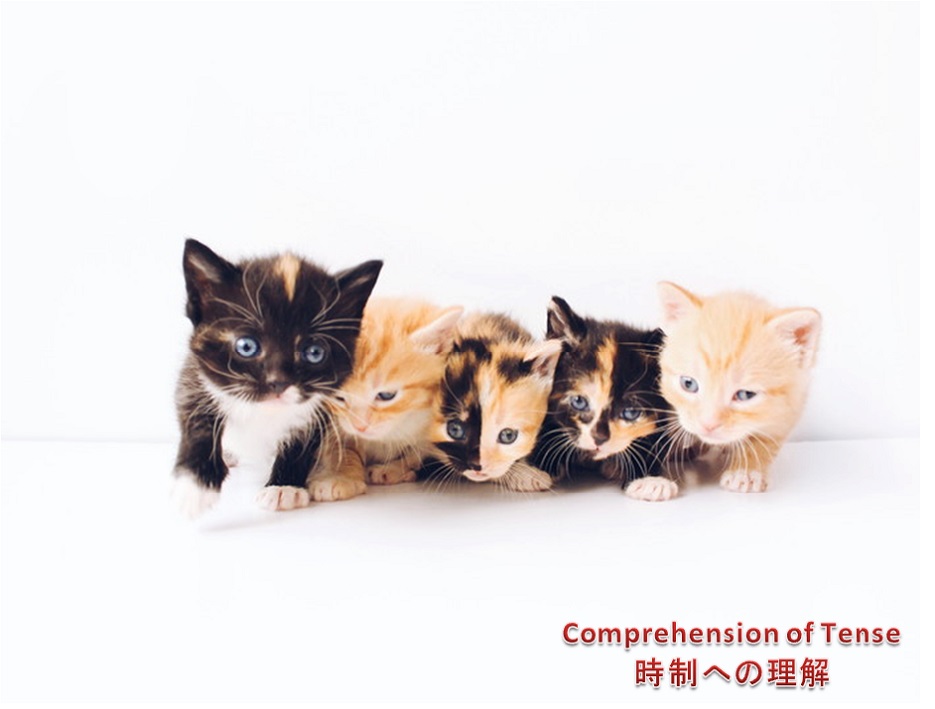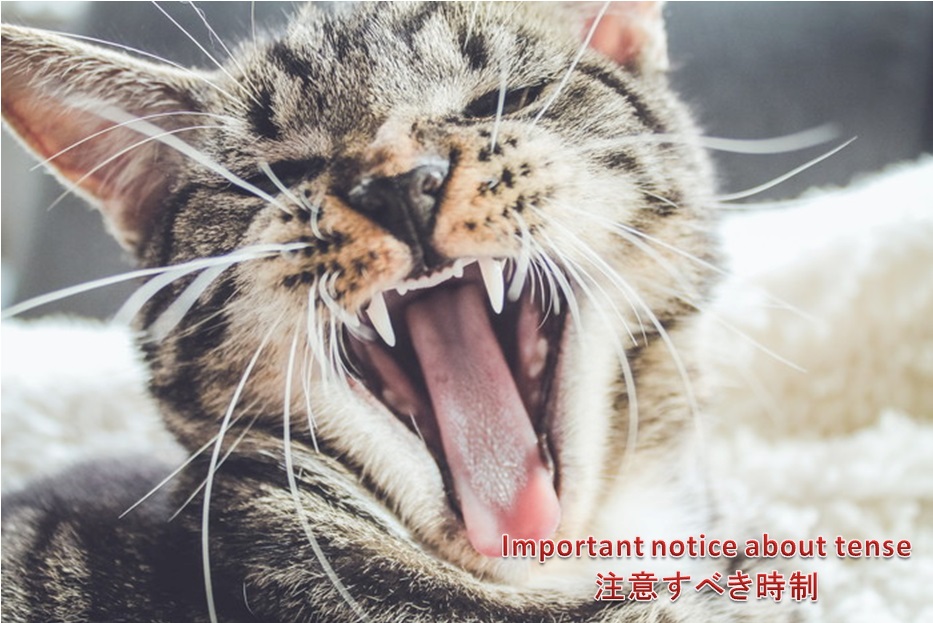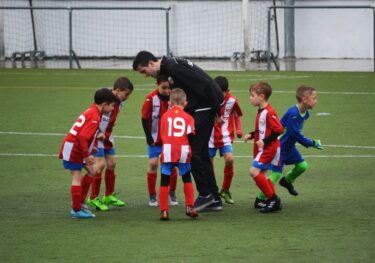英語の時制とは簡単にいうと、「出来事がいつ行われたか」を表現する用法です。
時制は英語の文法でもっとも重要なもののひとつですが、市販のテキストや参考書では説明がわかりにくく苦手意識を持っている人も少なくありません。
そこでWIZWORDs(ウィズワード)では時制への理解を深めるために、英語学習に「場面」を設定しながら、学んでいく方法を採用しています。
そして、英語は「場面」をイメージしながら、学習していくとさらに記憶への定着率が上がっていきます。
それでは、英語の時制を学んでいきましょう。
- 1 「場面」で時制
- 2 Comprehension of Tense 時制への理解
- 2.1 Tense 時制
- 2.1.1 Present tense 現在形
- 2.1.2 Present progressive tense 現在進行形
- 2.1.3 Present perfect tense 現在完了形
- 2.1.4 Present perfect progressive tense 現在完了進行形
- 2.1.5 Past tense 過去形
- 2.1.6 Past progressive tense 過去進行形
- 2.1.7 Past perfect tense 過去完了形
- 2.1.8 Past perfect progressive tense 過去完了進行形
- 2.1.9 Future tense 未来形
- 2.1.10 Future progressive tense 未来進行形
- 2.1.11 Future perfect tense 未来完了形
- 2.1.12 Future perfect progressive tense 未来完了進行形
- 2.1 Tense 時制
- 3 Important Notice about Tense 注意すべき時制
- 4 まとめ
「場面」で時制

とにかく英語を上達させたいと思うなら、その学習法は、
これだけです♪
英語を読んだり、聞いたり(インプット)したら、その読んだり聞いたりした言葉を必ず口に出したり、書いたり(アウトプット)することで、自分の記憶への定着率が上がり、英語上達への近道となり、自然と上達していくのです。
人間はなぜ言葉を覚えることができたかというと、赤ちゃんのときに親から話す言葉をただただ聞き取っていただけではなく、親としっかりとコミュニケーション(インプット&アウトプット)をしていたから言葉を覚えることができたのです。
なので、英語学習においてインプットからアウトプットはとても重要なファクターなのです。
さらにWIZWORDsでは、その場所やその場所での会話などの「場面」をイメージしながら英語を学ぶことでさらなる記憶への定着率を上げる「場面で英語」というものを推奨しています。
それでは、時制を「場面」をイメージしながら英語学習をしていきます。
Comprehension of Tense 時制への理解

You will focus on understanding the most important Tense in English learning. 英語学習における最も重要な時制を重点的に学習していきましょう。
The concept of tense in English is a method that we use to refer to time – past, present and future. 英語の時制の概念は、過去、現在、未来の時間を表現するために使用する方法です。
English tenses are divided into being 12 tenses types. 英語の時制は12のタイプに分けられます。
Please check the table of the below: 下図を確認してみてください:
| Present Tense 現在形 | Past Tense 過去形 | Future Tense 未来形 | |
| 1) She writes a diary. | 2) She wrote a diary. | 3) She will write a diary. | |
| Progressive tense 進行形 | Present progressive tense 現在進行委 | Past progressive tense 過去進行形 | Future progressive tense 未来進行形 |
| 4) She is writing a diary. | 5) She was writing a diary. | 6) She will be writing a diary. | |
| Perfect tense 完了形 | Present perfect tense 現在完了形 | Past perfect tense 過去完了形 | Future perfect tense 未来完了形 |
| 7) She has written a diary. | 8) She had written a diary. | 9) She will have written a diary. | |
| Perfect progressive tense 完了進行形 | Present perfect progressive tense 現在完了進行形 | Past perfect progressive tense 過去完了進行形 | Future perfect progressive tense 未来完了進行形 |
| 10) She has been writing a diary. | 11) She had been writing a diary. | 12) She will have been writing a diary. |
Then, let’s focus on tense. それでは時制を重点的に学習していきましょう。
If you understand the tense, read the English Conversation aloud. 時制を理解できたら、声に出して会話文を読んでみましょう。
If you can input, output it to improve the learning effect. インプットできたら、アウトプットして学習効果を高めましょう。
Tense 時制

Scene at home おうちでの場面
Present tense 現在形
|
What does Meg do every day? メグが毎日していることはなんですか? She writes a diary. 彼女は日記を書いています。 |
Present progressive tense 現在進行形
|
What is Meg doing? メグは何をしているの? She is writing a diary now. 今、彼女は日記を書いている。 |
Present perfect tense 現在完了形
|
How long has Meg written a diary? メグはどれくらい日記を書いているの? She has written a diary for only 3 months. 彼女は日記を書いてまだ3ヶ月です。 |
Present perfect progressive tense 現在完了進行形
|
Meg has been writing a diary for 4 years. メグは4年間ずーっと日記を書いている。 It’s part of her daily routine. 毎日の日課です。 |
Past tense 過去形
|
What did Meg write? メグは何を書いたの? She wrote a diary. 彼女は日記を書いた。 |
Past progressive tense 過去進行形
|
What was Meg doing 5 minutes ago? 5分前、メグは何をしていたの? She was writing a diary 5 minutes ago. 彼女は5分前に日記を書いていた。 |
Past perfect tense 過去完了形
|
How many years is her diary? 彼女の日記は何年分ですか? She had written a diary for 7 years. 彼女は7年間日記を書き続けた。 |
Past perfect progressive tense 過去完了進行形
|
Meg looks very tired. Is she all right? メグはとても疲れているね。大丈夫? She had been writing a diary for 8 hours before I came to her house. 私が彼女の家に来る前、彼女は8時間日記を書き続けていました。 |
Future tense 未来形
|
Meg is interested in writing a diary. メグは日記を書くことに興味がある。 She will write a diary because she is methodical. 彼女は性格がマメなので日記を書くでしょう。 |
Future progressive tense 未来進行形
|
Meg will be writing a diary by tomorrow. メグは明日までに日記を書いているでしょう。 I hope so. そうだといいね。 |
Future perfect tense 未来完了形
|
In a week, Meg will have written a diary for 11 years. あと1週間で、メグは11年間日記を書いていることになるでしょう。 That’s great! それは凄い! |
Future perfect progressive tense 未来完了進行形
|
Meg will have been writing a diary for 12 years by fall next year. メグは来年の秋で12年間日記を書いていることになるでしょう。 That’s a long time. それは長いね。 |
Important Notice about Tense 注意すべき時制

We’ve learned 12 types of tenses, but there are 2 things to keep in mind. 12タイプの時制を学びましたが、注意すべき点が2つあります。
You will learn 2 tips to note here. In particular, please note that “the sequence of tenses” is often not correctly understood. 時制で注意すべき点を2つここでは学習します。特に「時制の一致」については正しく理解されていないことが多いので注意しましょう。
Tip 1 ヒント1

The sequence of tenses means that when the verb in the main clause becomes the past, the tense of the verb in the subordinate clause is also affected and changes in the past or past participle. 「時制の一致」は主節の動詞が過去になると従属節内の動詞の時制も影響を受けて、過去、または過去完了に変わることを言います。
★If the verb in the main clause is in the present tense, it is not affected. 主節の動詞が現在形である場合は影響を受けることはない。
When the verb in the subordinate clause is present tense, 従属節内の動詞が現在形のとき、
I think she is cute.
私は彼女が可愛いと思う。
If the verb of the main clause is past, the verb of the subordinate clause is also past. 主節の動詞を過去形にすると従属節の動詞も過去形になります。
I thought she was cute.
私は彼女が可愛いと思った。
When the verb in the subordinate clause is past tense, 従属節内の動詞が過去形のとき、
I know he was a teacher.
私は彼が先生だったと知っている。
If the verb of the main clause is past, the verb of the subordinate clause is also past perfect. 主節の動詞を過去形にすると従属節の動詞も過去完了形になります。
I knew he had been a teacher.
私は彼が先生だったと知っていた。
However, there are exceptions. The sequence of tenses does not occur in the following cases: 但し、例外もあります。次の場合は時制の一致は起こりません。
The sequence of tenses does not occur if the subordinate clause is: 従属節が次の場合は時制の一致は起こらない。
a) General Truth 一般的心理
Ancient people knew *the sun rises in the east and sets in the west.
古代の人々は太陽が東から昇り西に沈むと知っていた。
* It is a universal truth that the sun rises from the east and sets in the west. In this case, the main clause is past, but the subordinate clause is not. *太陽が東から昇り西へ沈むことは普遍的な真理です。この場合は、主節が過去でも従属節は過去にはなりません。
b) Universal Facts 普遍的事実
We learned *the earth goes around the sun.
私たちは地球が太陽の周りを回っていると習った。
* What is done as a fact or practice that never changes does not apply the sequence of tenses. *決して変わらない事実や習慣として行われていることは時制の一致を適用しません。
c) Historical Facts 歴史上の事実
We learned *George Washington was the first president in the United States.
私たちはジョージワシントンがアメリカの初代大統領だと学びました。
*There is a principle that historical facts are always expressed in the past tense and not the past perfect. *歴史上の事実は、常に過去形で表現し、過去完了にはならないという原則があります。
d) Subjunctive 仮定法
She told me *if she had time, she would travel all over the world.
彼女はもし時間があれば世界中を旅行するのにと語った。
*Originally, the subjunctive is special in the sequence of tenses. The subjunctive uses the past tense to represent the present. And to indicate the past, use the past perfect. If the sequence of tenses applies to this, everything will be completed in the past, and the original tense will not be known whether it is the present or the past, so the assumption method is not applicable to the sequence of tenses. Therefore, the sentence after “if” is the same as the normal subjunctive, and the sequence of tenses does not apply. *元々、仮定法は時制が特別です。仮定法では現在を表わす場合、過去形を使います。また、過去を表わす場合は過去完了を使います。これに時制の一致を適用させてしまうと、全てが過去完了になり、現在のことなのか過去のことなのか本来の時制がわからなくなってしまうため仮定法は時制の一致の適用外です。だから、「if」以降の文は通常の仮定法の時制のままで時制の一致は適用されません。
e) Proverb ことわざ
Donald Trump often said *time is money.
ドナルド・トランプはよく時は金なりと言っていた。
*Proverbs are used verbatim, so the sequence of tenses does not apply. *ことわざは一言一句変えずに使うのが原則なので時制の一致が適用されません。
The sequence of tenses : Express future content with past auxiliary verbs 時制の一致:未来の内容は過去の助動詞で表す
To match the tense when the content of the subordinate clause represents the future, use the past tense of the auxiliary verb. 従属節の内容が未来を表すときに時制を一致させるには、助動詞の過去形を使います。↓↓↓
He says he can finish the work by Friday morning.
彼はその仕事を金曜の朝までに終わらせられると言っている。
He said he could finish the work by Friday morning.
彼はその仕事を金曜日の朝までに終わらせられると言っていた。
- will+動詞の原形 → would+動詞の原形
- can+動詞の原形 → could+動詞の原形
- may+動詞の原形 → might+動詞の原形
☆mustとshouldはそのまま
Scene in the office オフィスでの場面
|
How long does Mr. Tyson say that the job can be done? タイソン氏はその仕事をいつまでに終えることができると言っているの? He says he can finish the work by Friday morning. 彼はその仕事を金曜の朝までに終わらせられると言っています。 |
|
How long did Mr. Tyson say that the job could be done? タイソン氏はその仕事をいつまでに終えることができると言っていたの? He said he could finish the work by Friday morning. 彼はその仕事を金曜日の朝までに終わらせられると言っていた。 |
Tip 2 ヒント2

The sequence of tenses in the adverbial clause indicating time and adverbial clause indicating condition 時を表す副詞節、条件を表す副詞節での時制の一致
- 「when」「before」「till」「until」「as soon as」などのthe adverbial clause indicating time 時を表す副詞節
- 「if」「unless」などのadverbial clause indicating condition 条件を表す副詞節
は未来のことでも現在形で表します。
You will understand when you grow up.
大きくなったら分かるでしょう。
Please give me a call before you come to my house.
家に来る前に電話をください。
I will stay here till the snow stops.
雪がやむまで私はここにいます。
Leave things as they are until the police arrive.
警察が到着するまでそれらはそのままにしてください。
Let’s start as soon as she comes.
彼女が来たらすぐに始めましょう。
We will go out to the ball park unless it rains.
雨が降らない限り私たちは野球場に繰り出します。
Your lesson will be canceled if it snows tomorrow.
明日雪が降れば、レッスンは中止でしょう。
場面で注意すべき時制

If you understand the notice about tense, read the English conversation aloud. 注意すべき時制を理解できたら、声に出して会話文を読んでみましょう。
If you can input, output it to improve the learning effect. インプットできたら、アウトプットして学習効果を高めましょう。
Scene at school 学校での場面
|
Who do you think is cute in this class? このクラスの中で誰が一番可愛いと思う? I think Layla is cute. 私はレイラが可愛いと思う。 |
|
Who did you think was cute in this class? あなたはこのクラスの中で誰が一番可愛いと思った? I thought Layla was cute. 私はレイラが可愛いと思った。 thought: think-thought-thought thinkの過去形 |
|
Do you know what Mr. Johnson was doing? ジョンソン氏は何をしていたか知っていますか? I know he was a teacher. 私は彼が先生だったと知っている。 |
|
Did anyone know that Mr. Johnson was a teacher? 誰かジョンソン氏が先生だったって知っていた人はいますか? I knew he has been a teacher. 私は彼が先生だったと知っていた。 |
Exceptions of the sequence of tenses: 時制の一致の例外
a) General Truth 一般的心理
I’m impressed, ancient people knew the sun rises in the east and sets in the west.
古代の人々は太陽が東から昇り西に沈むと知っていたことに感動です。
b) Universal Facts 普遍的事実
I learned the earth goes around the sun when I was a child.
私は地球が太陽の周りを回っていると子供の頃に習った。
c) Historical Facts 歴史上の事実
We learned George Washington was the first president in the US when we were little.
私たちはジョージワシントンがアメリカの初代大統領だと小さい時に学びました。
d) Subjunctive 仮定法
She told me 5 years ago, if she had time, she would travel all over the world.
彼女はもし時間があれば世界中を旅行するのにと5年前に語った。
e) Proverb ことわざ
Mr. Mayweather often said practice makes perfect.
メイウェザーさんはよく練習によって完璧を目指しなさいと言った。
Scene at home おうちでの場面
|
Is alcohol delicious? お酒って美味しいの? You will understand when you grow up. 大人になったら分かるよ。 |
|
I will arrive at your home at least 10 minutes. あと10分で私はあなたの家に到着の予定です。 Please give me a call before you come to my house. 家に来る前に電話をください。 |
|
Oh! It’s snowing right now. お!雪が降っているね。 I will stay here till the snow stops. 雪がやむまで私はここにいます。 |
|
A car has gone into my house, what should I do? 車が私の家に突っ込んできたんですけど、どうしたらいいですか? Leave things as they are until the police arrive. 警察が到着するまでそれらはそのままにしてください。 |
|
Layla has not come here yet. レイラがまだ来ていません。 Let’s start as soon as she comes. 彼女が来たらすぐに始めましょう。 |
まとめ
場面をイメージしながら時制を学んでみていかがでしたでしょうか。
イメージしやすい会話形式になっているので、できれば読んでインプットしたら、発話して(アウトプットして)みてください。自分の記憶への定着率が必ず上がるはずです。
英文の後に日本語訳があるのは、英語は英語で覚えていくと更なる記憶への定着率が上がるため、敢えてそのようにしています。
これからも、自分のイメージ力を駆使しながら、その場所やその場所での会話などの「場面」をイメージしながら英語を学ぶことで更なる記憶への定着率を上げる「場面で英語」を楽しんで学んでもらえたらWIZWORDs(ウィズワード)の最高の喜びとなります。
英語における「態」とは能動態と受動態に分けられます。 「能動態と受動態って何?」 と思ってしまいますが、能動態というと言葉は難しいですが、「主語が~をする」という意味になる一般によく見られ[…]










